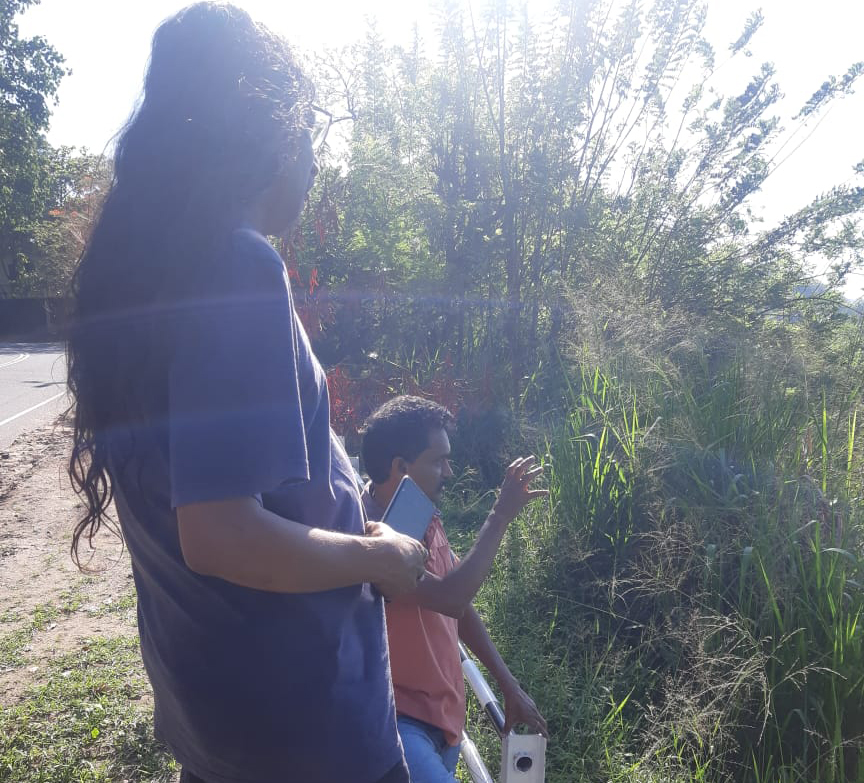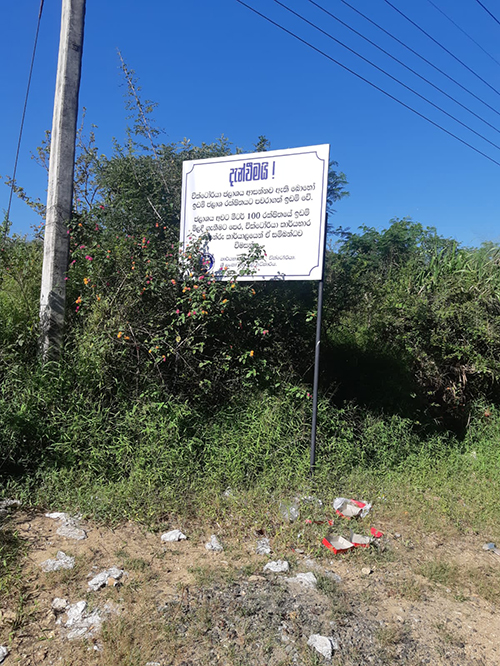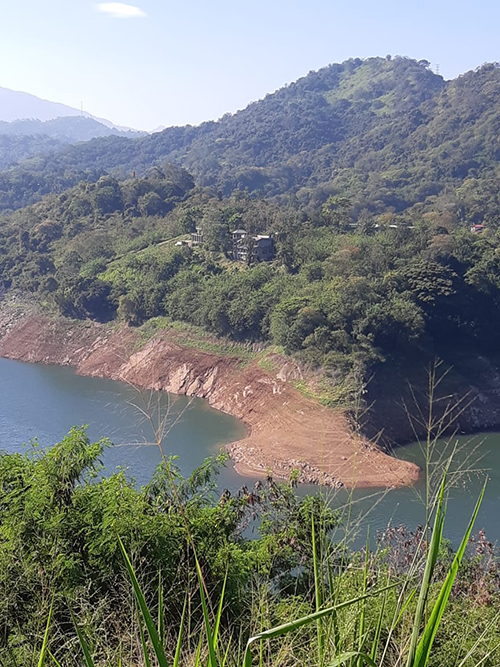Well now. Was this an inauspicious start or what? Let me explain.
We had our strategy down pat and aired to all at the kick-off meet held in March. By that time, I had also gone some ways into the desk study of the terrain. However, as with all our projects, Suranjan and I do an initial reccy of the terrain before we start talking turkey and doing that there turkey to the finest level of haut cuisine imaginable.

Suranjan shares his wealth of knowledge on the terrain
It is mandatory for the two of us because it is during those hours and hours of travel that Sura talks almost incessantly, pouring forth that incredible knowledge of the country, its history and its kaleidoscopic variety of people, places, things and creatures that no one else has even an inkling of. I can read a hundred papers in a week (which I actually do but it is zip compared to the knowledge I get on these journeys of ours). His is citizen science blended with political and social sense. Mine is mainstream science blended with art and heart. To put it as mildly as possible? We meld. We mesh. We arrive in third spaces that neither of us thought we could get to when we start an exercise of this nature. Armed with a few google map printouts (for my benefit) and our trusted field kits that included my ever present bottle of local booze (I never take imports on these journeys), we did the route that straddles the southern border of the VRR sanctuary.
VRR – Victoria-Randenigala-Rantambe. Three mega dams. Dams that have damned my nation in no small measure.
Yet, friends, it was a strangely nostalgic journey for me. One of clear and glad memories clashing with dark current conflicts.
You see, as an 18 year old, my first job was on the Maduru-Oya dam when it was being built. I shucked concrete by the cubic meter from 7 a.m. to 6 p.m. and sometimes all the way to 6 a.m. while also being a technician at the contractor’s (FAFJ’s) soil testing lab. I know forever the sound of the wind howling on top of a half built mega-structure at 2 am. I still remember what it felt like to be taught to hunt and fish by Paul Grigg (a Baticaloa Burgher). I know what it felt like to hobnob with the Adivasi community and have them give me my first joint. My uncle was the chief engineer on the Randenigala dam as well as the Maduru-Oya dam when those two were built. My father was on the high-level negotiating team talking to the British venture BBN who built the Victoria dam and the Swedish construction giant Skanska who built the Kotmale dam. Kid though I was, I was up-close and personal with the things I had a hand in building (tiny though my contribution was). Things that I am fighting against today so, 40 years on, almost to the day, this specific journey among many such Suranjan and I have taken over the years was…how to put it…surreal… to say the least.
As Suranjan pointed out, the reservoirs themselves are pretty much silted up. When there are torrential rains, they fill up quickly. Too quickly. What happens? In order to protect their damned dams, the engineers must open the sluices. Then the rain stops. All that water is gone for good and what remains evaporates quickly. Too quickly. This time because of the temperature rise in the area due to global warming. That double whammy bodes no good for water management now, does it? Some of that silting is because people has started cultivating on the very edge of the reservoirs when their water levels go down to take advantage of the richness of the soil. When they are done, the soil is loose and slides into the water, making a mockery of the silt traps because you cannot silt trap the whole water body. Then there was the limestone. The tremors. The earth slips. The component deaths of river segments. The disenfranchised IPLCs. The misguided policing against laws no one wants or believe in anymore.

The signboard warns people to think twice before buying land in the areas because most of it is “conservation land”. The notice will soon be covered by the invasive plant Lantana growing in front of it while the ground will soon be covered by garbage. Conservation? Oh purleez!
All of that took us maybe seven hours. Seven hours of tutoring for me that I could not have obtained from 10 years of mainstream research. Right up to about 5 kilometres from the Randenigala dam on the absolutely gorgeous Raja Veediya (Avenue of Kings). It was 11.30 a.m. It was then that Sura’s ever faithful PRADO decided to give up the ghost. Right in the middle of elephant infested jungle without a soul in sight for miles around.
Of all of the vehicles that zoomed by us that day, the only ones to stop were… of all people…the drivers of massive tipper trucks used for mining sand from the Mahaweli river. Our worst enemy at the operational level perhaps, but they stopped. They’ve been there. They knew the dangers we faced. The elephants in that area are not half-tamed tourist teasers but the real deal. They will shoot (on in this case, kick, overturn and trample) before they ask any questions. We had a kid with us. A youngling we were training. We had to get her to safety first so I had the hard task of leaving Sura behind and traveling 78 Kilometres in a Tuk. Those great good Samaritans, the tipper truckers got the mechanics from Mahiyangana and the vehicle movers. They had other things to do but repeatedly called in to check if Sura was ok and getting the help he needed. He finally gets to Hettipola at 10 p.m. after having had to load the SUV on to a truck and have it hauled to Mahiyanganaya. It took us the rest of our planned journey to get the vehicle fixed because the parts had to be brought up from Colombo.
So much for that. But that unanticipated blow hurt. I really needed a lot more “data upstreaming” from Sura but it was not to be. It was a harsh testament of the reality of our work but this had never happened to us before. We had never had to basically abandon a task in the field for any reason whatsoever. I guess there is always a first time for everything as they say.
Yet, we made good friends. The blokes operating those tippers for example. They had no big ideas of environment damage or what have you. They were doing a hard job in a dangerous place. They looked out for one another and that generosity was extended to us. Gratis. The Tuk driver was another. He was a wealth of knowledge and didn’t mind taking me (and the kid) here and there to take videos and photos even as I was taking her to safety.
We are the Greens. Those who help us are helped by us a thousand fold. Even if that help has to come out of our own pockets. This reduces in action, to the management of issues in micro-geographies with individuals. Not, and repeat, NOT! macro ideas of law and legislation. How easy is it to persecute and hound a tipper driver? A substance hunter? A cardamom picker? Not hard at all. But look at all of the “campaigns” of mad NGOs across the world? They will do exactly that and demean themselves and insult their target communities without a care in the world. They only care about the next dollar regardless of the astigmatism of those that deliver that dollar or the myopia of those that use that dollar.

Fractured land bordering the reservoir spills soil into it that will eventually end up as sediment that will finally silt over the entire water body.
People such as those that helped us? They are human. Not project participants or budget lines. We will reciprocate during SAFER because they have come through for the Greens when our chips were down. When our cards showed only a pair.
All, however, is not lost. The start was affirmed, the chart was clarified, the part we must play in a greater order of men and matters, women and worries, youth and yowls, kids and kindness, is now known (That is a direct translation of Adivasi wisdom from Papua New Guinea).
As with all our projects that start with good omens or bad, right thinking or mad, joyous anticipation or sad?
We will not win for ourselves anything. Why? Because if we win then our communities will lose.If we win anything at all it will be that we win the effort – not its reward. That goes to the communities.
Therefore, let it be that our beneficiaries win at our cost. With this exercise that is the given. As I told Malvika during the design phase before even submitting the proposal “I have never lost a call I believed in”.
The Greens have never lost an action they believed in either.




